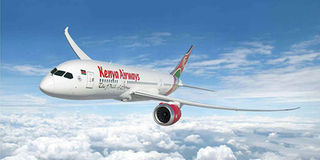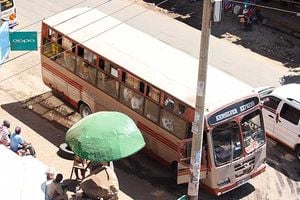Africa can ride out the Covid-19 storm with own air travel market

A KQ plane on flight. PHOTO | FILE | NATION MEDIA GROUP
What you need to know:
- Unfortunately, the economic development of Africa is disproportionate to its size and potential
- The Covid-19 pandemic has left businesses struggling to generate cash to keep the wheels turning and resulted into massive job losses.
When the novel coronavirus outbreak was first reported in Wuhan, China, it was just a local health problem that morphed into a pandemic and global economic disaster.
The Covid-19 pandemic has left businesses struggling to generate cash to keep the wheels turning and resulted into massive job losses in both the formal and informal sectors of the economy.
The aviation industry finds itself at the centre of the turmoil. The sector, which plays a critical role in growing economies across the world, is, arguably, the most severely affected by the global pandemic.
According to International Air Transport Association (IATA), the aviation industry supports 65.5 million jobs with an economic impact of $2.7 trillion (Sh270 trillion) globally.
It contributes an estimated $55.8 billion (Sh558 billion) to Africa’s economy, at 2.6 per cent of gross domestic product (GDP), and close to 6.2 million job opportunities. In Kenya, the sector contributes up to 4.6 per cent of GDP and supports 410,000 jobs indirectly.
CRISIS
Regrettably, with the current crisis, this contribution is at risk. IATA estimates that, in Africa alone, airlines could lose upwards of $4.6 million (Sh460 million). With a vast majority of operators barely breaking even during good times, one can only imagine what awaits us on the other side of this crisis. This is an unprecedented crisis and, therefore, impossible to have a perfect response.
An important lesson learnt is that one can never be too prepared for a crisis. In addition, plans are, at best, tentative when a situation is fluid. Creativity in solutions is a prerequisite.
When the dust settles, a number of scenarios are likely to play out. First, the industry is likely to take up to two years to return to even 75 per cent of its pre-Covid-19 operations. Full recovery may take longer. Kenya is headed towards the electioneering period and the effect that normally has on business could be an impediment in this recovery.
Secondly, the crisis provides a glimpse of what the future holds. For instance, more business travellers could opt for online meetings and training, hence reduced business travel. Leisure travel may also take time to recover due to reduced disposable income in upper and middle class. Leisure travellers may prefer destinations nearer to home with specific hygiene conditions.
However, an upsurge of demand is likely right at the end of the Covid-19 crisis, which will then die off in about a month. The spike will be driven by people going back to their homes or countries of work. Thereafter, the seat supply is bound to remain excessive.
REGAIN MARKET SHARE
With these scenarios, airlines will be tempted to sweat assets as much as possible to regain market share, leading to excess supply and, therefore, a general drop in yields and profitability.
On the other hand, because many aircraft will remain grounded, cheap financing may arise. This could create distressed capacity at record-low rates, leading to opportunities to renegotiate some of the contracts and re-evaluate capacity. This availability of financing may also allow aggressive and ambitious start-ups with cost advantages and digital practices to enter the market.
So, what next?
Africa has a wide range of natural and human resource. It has the youngest and fastest-growing population. It is also the second-largest continent in both population and size. But it also has the highest mortality rate and lowest disposal income.
Unfortunately, the economic development of Africa is disproportionate to its size and potential. And the aviation industry epitomises this problem. Despite having 13 per cent of the world’s population, it commands a paltry two per cent of the air traffic — both passengers and goods.
A way has to be found for Africa to work more closely to take advantage of its own markets and build its capacity.
Mr Kilavuka is the group managing director and chief executive officer of Kenya Airways. [email protected].





